University International Business Essay: MNCs, Regulations, and FDI
VerifiedAdded on 2022/08/21
|12
|3797
|14
Essay
AI Summary
This essay delves into the multifaceted world of international business, focusing on multinational companies (MNCs) and their strategic operations. It examines how MNCs navigate national and regional differences in culture and regulations to their advantage, considering factors like location advantages offered by host countries, the extent to which MNCs pursue international uniformity, and the optimal responses of states to foreign direct investment (FDI). The essay explores how regulations, particularly concerning taxation and environmental protection, impact MNC operations. It further analyzes strategies for maintaining international uniformity, such as fostering a diverse workforce and promoting multilingual communication. The conclusion emphasizes the mutual benefits of FDI for both host countries and MNCs, advocating for its active encouragement to stimulate economic growth. This essay provides a comprehensive understanding of the complex interplay between MNCs, regulations, and host countries in the global business landscape.
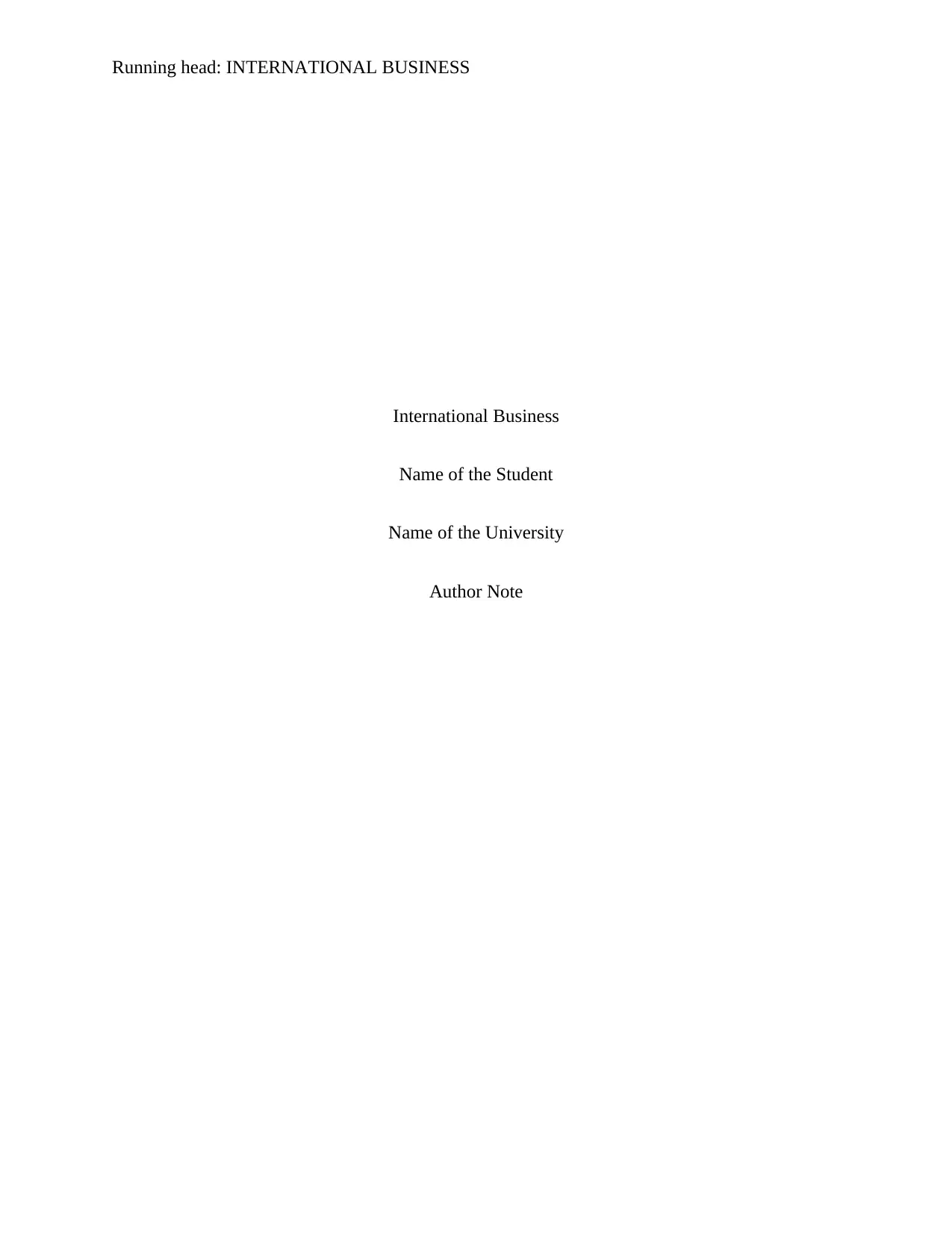
Running head: INTERNATIONAL BUSINESS
International Business
Name of the Student
Name of the University
Author Note
International Business
Name of the Student
Name of the University
Author Note
Paraphrase This Document
Need a fresh take? Get an instant paraphrase of this document with our AI Paraphraser
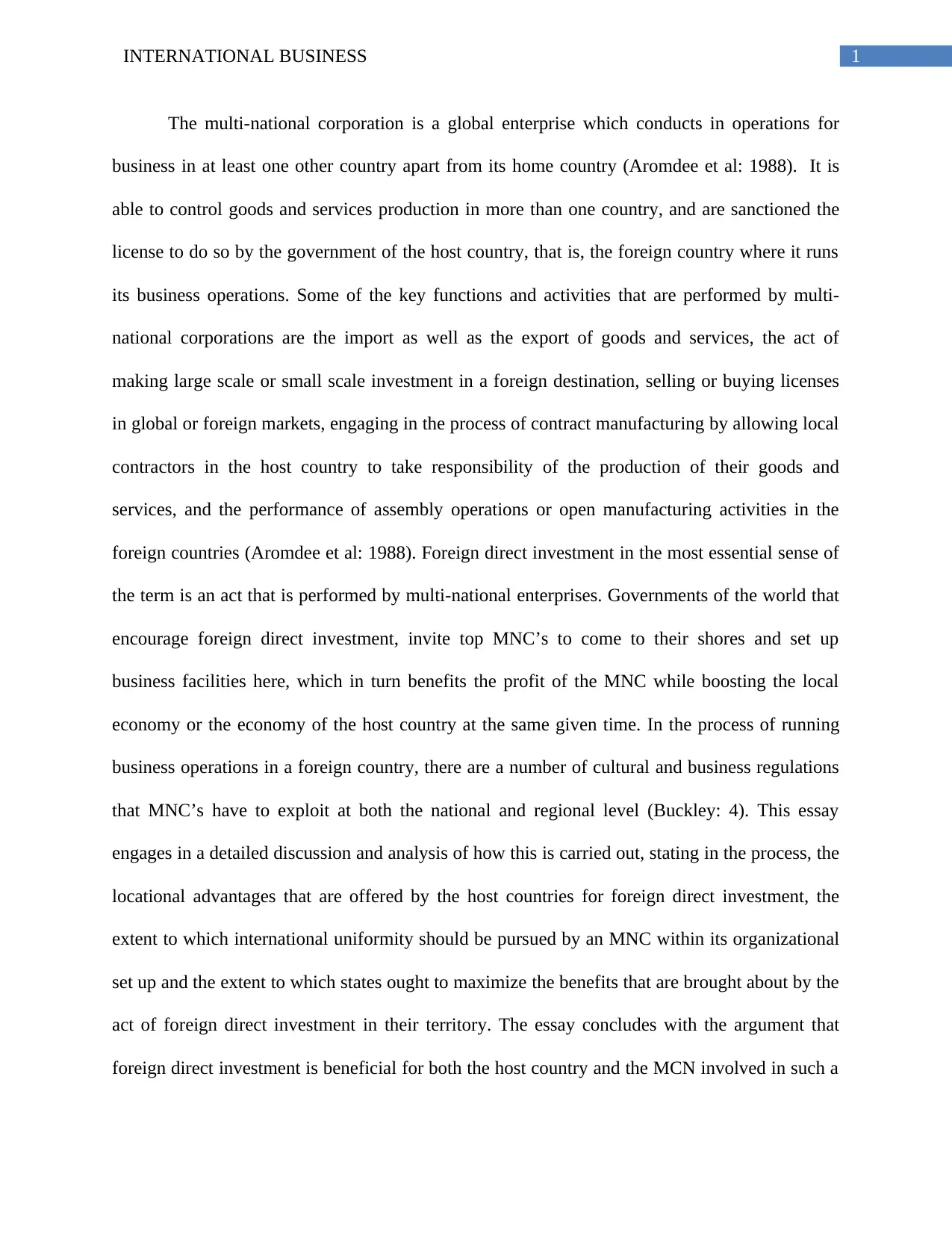
1INTERNATIONAL BUSINESS
The multi-national corporation is a global enterprise which conducts in operations for
business in at least one other country apart from its home country (Aromdee et al: 1988). It is
able to control goods and services production in more than one country, and are sanctioned the
license to do so by the government of the host country, that is, the foreign country where it runs
its business operations. Some of the key functions and activities that are performed by multi-
national corporations are the import as well as the export of goods and services, the act of
making large scale or small scale investment in a foreign destination, selling or buying licenses
in global or foreign markets, engaging in the process of contract manufacturing by allowing local
contractors in the host country to take responsibility of the production of their goods and
services, and the performance of assembly operations or open manufacturing activities in the
foreign countries (Aromdee et al: 1988). Foreign direct investment in the most essential sense of
the term is an act that is performed by multi-national enterprises. Governments of the world that
encourage foreign direct investment, invite top MNC’s to come to their shores and set up
business facilities here, which in turn benefits the profit of the MNC while boosting the local
economy or the economy of the host country at the same given time. In the process of running
business operations in a foreign country, there are a number of cultural and business regulations
that MNC’s have to exploit at both the national and regional level (Buckley: 4). This essay
engages in a detailed discussion and analysis of how this is carried out, stating in the process, the
locational advantages that are offered by the host countries for foreign direct investment, the
extent to which international uniformity should be pursued by an MNC within its organizational
set up and the extent to which states ought to maximize the benefits that are brought about by the
act of foreign direct investment in their territory. The essay concludes with the argument that
foreign direct investment is beneficial for both the host country and the MCN involved in such a
The multi-national corporation is a global enterprise which conducts in operations for
business in at least one other country apart from its home country (Aromdee et al: 1988). It is
able to control goods and services production in more than one country, and are sanctioned the
license to do so by the government of the host country, that is, the foreign country where it runs
its business operations. Some of the key functions and activities that are performed by multi-
national corporations are the import as well as the export of goods and services, the act of
making large scale or small scale investment in a foreign destination, selling or buying licenses
in global or foreign markets, engaging in the process of contract manufacturing by allowing local
contractors in the host country to take responsibility of the production of their goods and
services, and the performance of assembly operations or open manufacturing activities in the
foreign countries (Aromdee et al: 1988). Foreign direct investment in the most essential sense of
the term is an act that is performed by multi-national enterprises. Governments of the world that
encourage foreign direct investment, invite top MNC’s to come to their shores and set up
business facilities here, which in turn benefits the profit of the MNC while boosting the local
economy or the economy of the host country at the same given time. In the process of running
business operations in a foreign country, there are a number of cultural and business regulations
that MNC’s have to exploit at both the national and regional level (Buckley: 4). This essay
engages in a detailed discussion and analysis of how this is carried out, stating in the process, the
locational advantages that are offered by the host countries for foreign direct investment, the
extent to which international uniformity should be pursued by an MNC within its organizational
set up and the extent to which states ought to maximize the benefits that are brought about by the
act of foreign direct investment in their territory. The essay concludes with the argument that
foreign direct investment is beneficial for both the host country and the MCN involved in such a
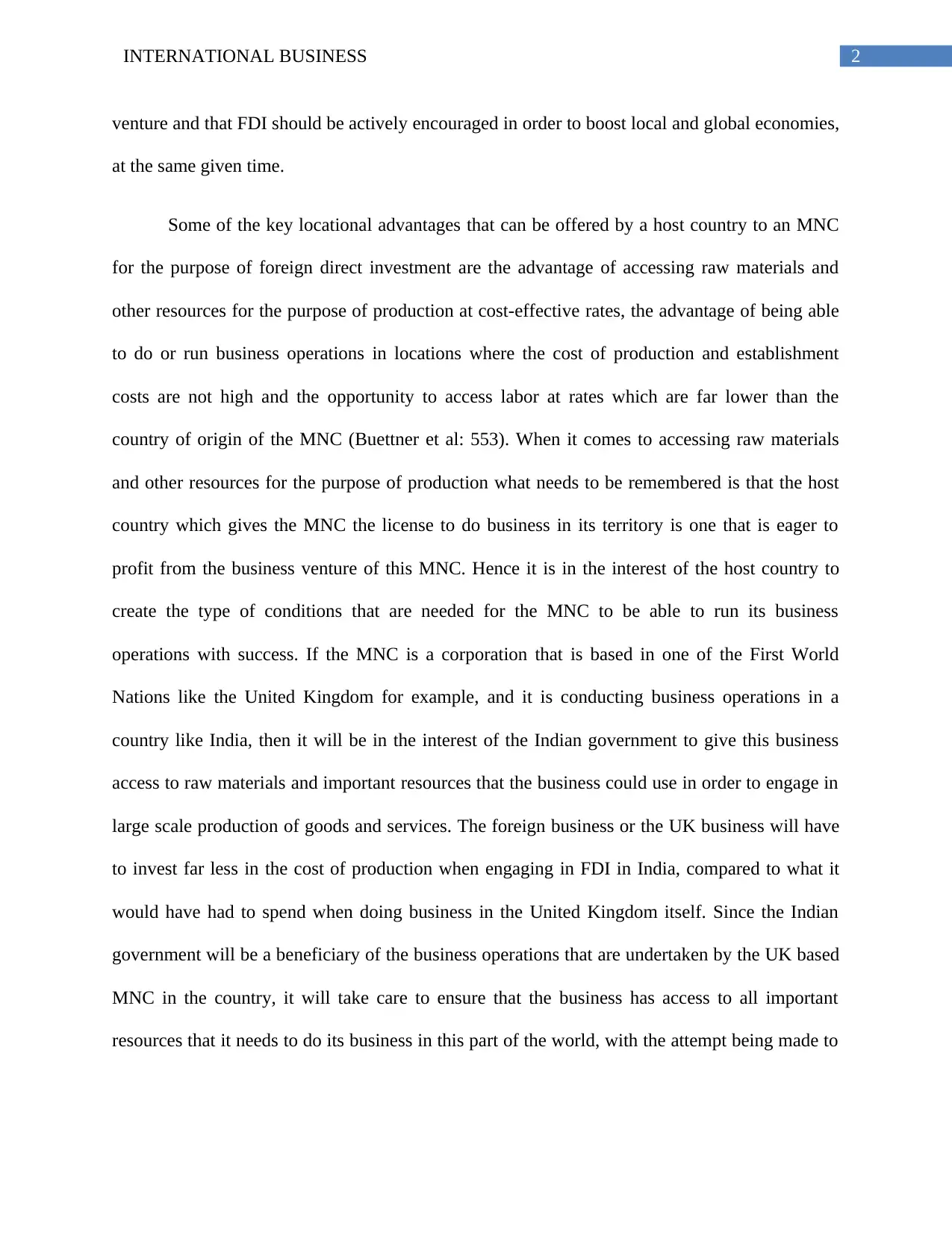
2INTERNATIONAL BUSINESS
venture and that FDI should be actively encouraged in order to boost local and global economies,
at the same given time.
Some of the key locational advantages that can be offered by a host country to an MNC
for the purpose of foreign direct investment are the advantage of accessing raw materials and
other resources for the purpose of production at cost-effective rates, the advantage of being able
to do or run business operations in locations where the cost of production and establishment
costs are not high and the opportunity to access labor at rates which are far lower than the
country of origin of the MNC (Buettner et al: 553). When it comes to accessing raw materials
and other resources for the purpose of production what needs to be remembered is that the host
country which gives the MNC the license to do business in its territory is one that is eager to
profit from the business venture of this MNC. Hence it is in the interest of the host country to
create the type of conditions that are needed for the MNC to be able to run its business
operations with success. If the MNC is a corporation that is based in one of the First World
Nations like the United Kingdom for example, and it is conducting business operations in a
country like India, then it will be in the interest of the Indian government to give this business
access to raw materials and important resources that the business could use in order to engage in
large scale production of goods and services. The foreign business or the UK business will have
to invest far less in the cost of production when engaging in FDI in India, compared to what it
would have had to spend when doing business in the United Kingdom itself. Since the Indian
government will be a beneficiary of the business operations that are undertaken by the UK based
MNC in the country, it will take care to ensure that the business has access to all important
resources that it needs to do its business in this part of the world, with the attempt being made to
venture and that FDI should be actively encouraged in order to boost local and global economies,
at the same given time.
Some of the key locational advantages that can be offered by a host country to an MNC
for the purpose of foreign direct investment are the advantage of accessing raw materials and
other resources for the purpose of production at cost-effective rates, the advantage of being able
to do or run business operations in locations where the cost of production and establishment
costs are not high and the opportunity to access labor at rates which are far lower than the
country of origin of the MNC (Buettner et al: 553). When it comes to accessing raw materials
and other resources for the purpose of production what needs to be remembered is that the host
country which gives the MNC the license to do business in its territory is one that is eager to
profit from the business venture of this MNC. Hence it is in the interest of the host country to
create the type of conditions that are needed for the MNC to be able to run its business
operations with success. If the MNC is a corporation that is based in one of the First World
Nations like the United Kingdom for example, and it is conducting business operations in a
country like India, then it will be in the interest of the Indian government to give this business
access to raw materials and important resources that the business could use in order to engage in
large scale production of goods and services. The foreign business or the UK business will have
to invest far less in the cost of production when engaging in FDI in India, compared to what it
would have had to spend when doing business in the United Kingdom itself. Since the Indian
government will be a beneficiary of the business operations that are undertaken by the UK based
MNC in the country, it will take care to ensure that the business has access to all important
resources that it needs to do its business in this part of the world, with the attempt being made to
⊘ This is a preview!⊘
Do you want full access?
Subscribe today to unlock all pages.

Trusted by 1+ million students worldwide
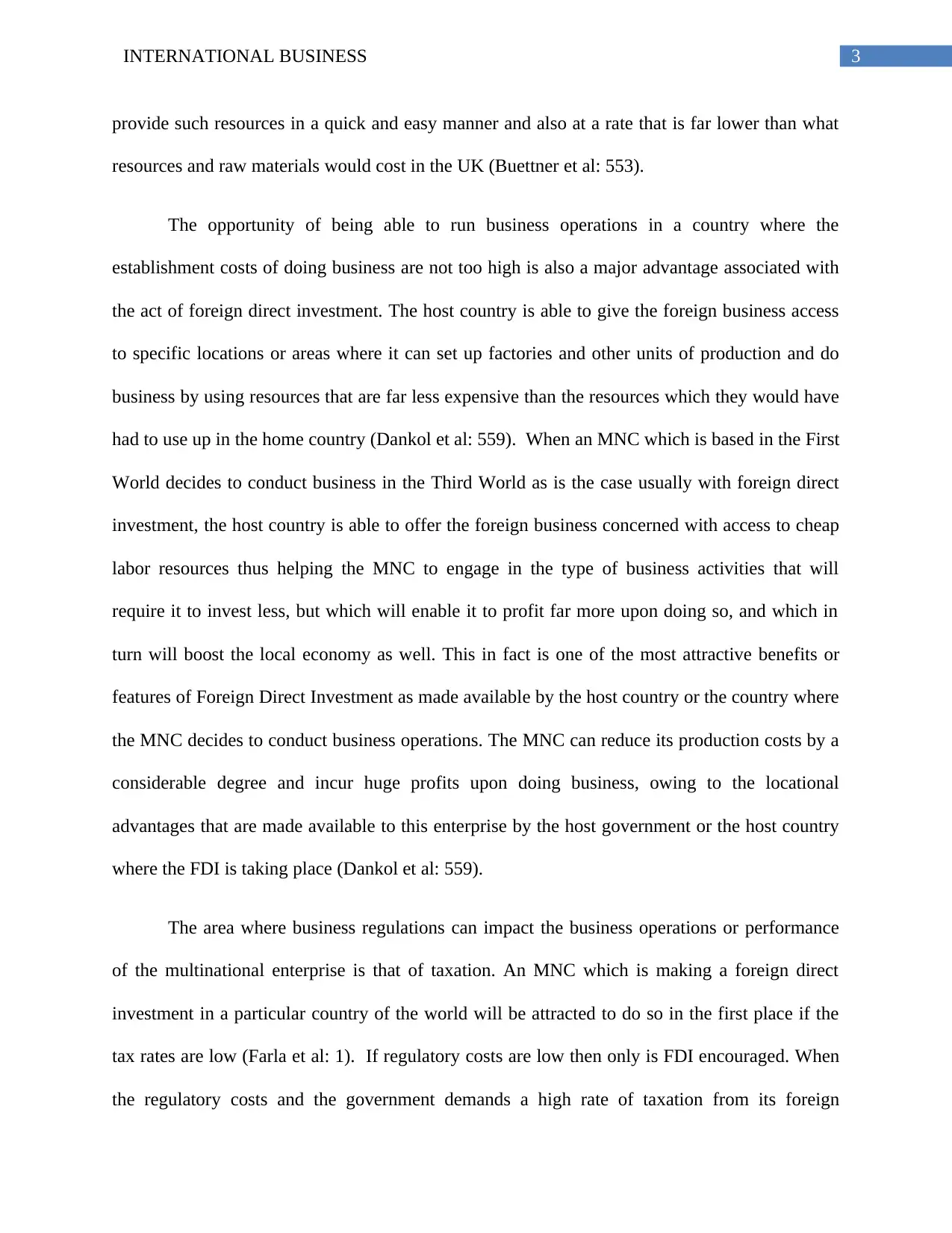
3INTERNATIONAL BUSINESS
provide such resources in a quick and easy manner and also at a rate that is far lower than what
resources and raw materials would cost in the UK (Buettner et al: 553).
The opportunity of being able to run business operations in a country where the
establishment costs of doing business are not too high is also a major advantage associated with
the act of foreign direct investment. The host country is able to give the foreign business access
to specific locations or areas where it can set up factories and other units of production and do
business by using resources that are far less expensive than the resources which they would have
had to use up in the home country (Dankol et al: 559). When an MNC which is based in the First
World decides to conduct business in the Third World as is the case usually with foreign direct
investment, the host country is able to offer the foreign business concerned with access to cheap
labor resources thus helping the MNC to engage in the type of business activities that will
require it to invest less, but which will enable it to profit far more upon doing so, and which in
turn will boost the local economy as well. This in fact is one of the most attractive benefits or
features of Foreign Direct Investment as made available by the host country or the country where
the MNC decides to conduct business operations. The MNC can reduce its production costs by a
considerable degree and incur huge profits upon doing business, owing to the locational
advantages that are made available to this enterprise by the host government or the host country
where the FDI is taking place (Dankol et al: 559).
The area where business regulations can impact the business operations or performance
of the multinational enterprise is that of taxation. An MNC which is making a foreign direct
investment in a particular country of the world will be attracted to do so in the first place if the
tax rates are low (Farla et al: 1). If regulatory costs are low then only is FDI encouraged. When
the regulatory costs and the government demands a high rate of taxation from its foreign
provide such resources in a quick and easy manner and also at a rate that is far lower than what
resources and raw materials would cost in the UK (Buettner et al: 553).
The opportunity of being able to run business operations in a country where the
establishment costs of doing business are not too high is also a major advantage associated with
the act of foreign direct investment. The host country is able to give the foreign business access
to specific locations or areas where it can set up factories and other units of production and do
business by using resources that are far less expensive than the resources which they would have
had to use up in the home country (Dankol et al: 559). When an MNC which is based in the First
World decides to conduct business in the Third World as is the case usually with foreign direct
investment, the host country is able to offer the foreign business concerned with access to cheap
labor resources thus helping the MNC to engage in the type of business activities that will
require it to invest less, but which will enable it to profit far more upon doing so, and which in
turn will boost the local economy as well. This in fact is one of the most attractive benefits or
features of Foreign Direct Investment as made available by the host country or the country where
the MNC decides to conduct business operations. The MNC can reduce its production costs by a
considerable degree and incur huge profits upon doing business, owing to the locational
advantages that are made available to this enterprise by the host government or the host country
where the FDI is taking place (Dankol et al: 559).
The area where business regulations can impact the business operations or performance
of the multinational enterprise is that of taxation. An MNC which is making a foreign direct
investment in a particular country of the world will be attracted to do so in the first place if the
tax rates are low (Farla et al: 1). If regulatory costs are low then only is FDI encouraged. When
the regulatory costs and the government demands a high rate of taxation from its foreign
Paraphrase This Document
Need a fresh take? Get an instant paraphrase of this document with our AI Paraphraser
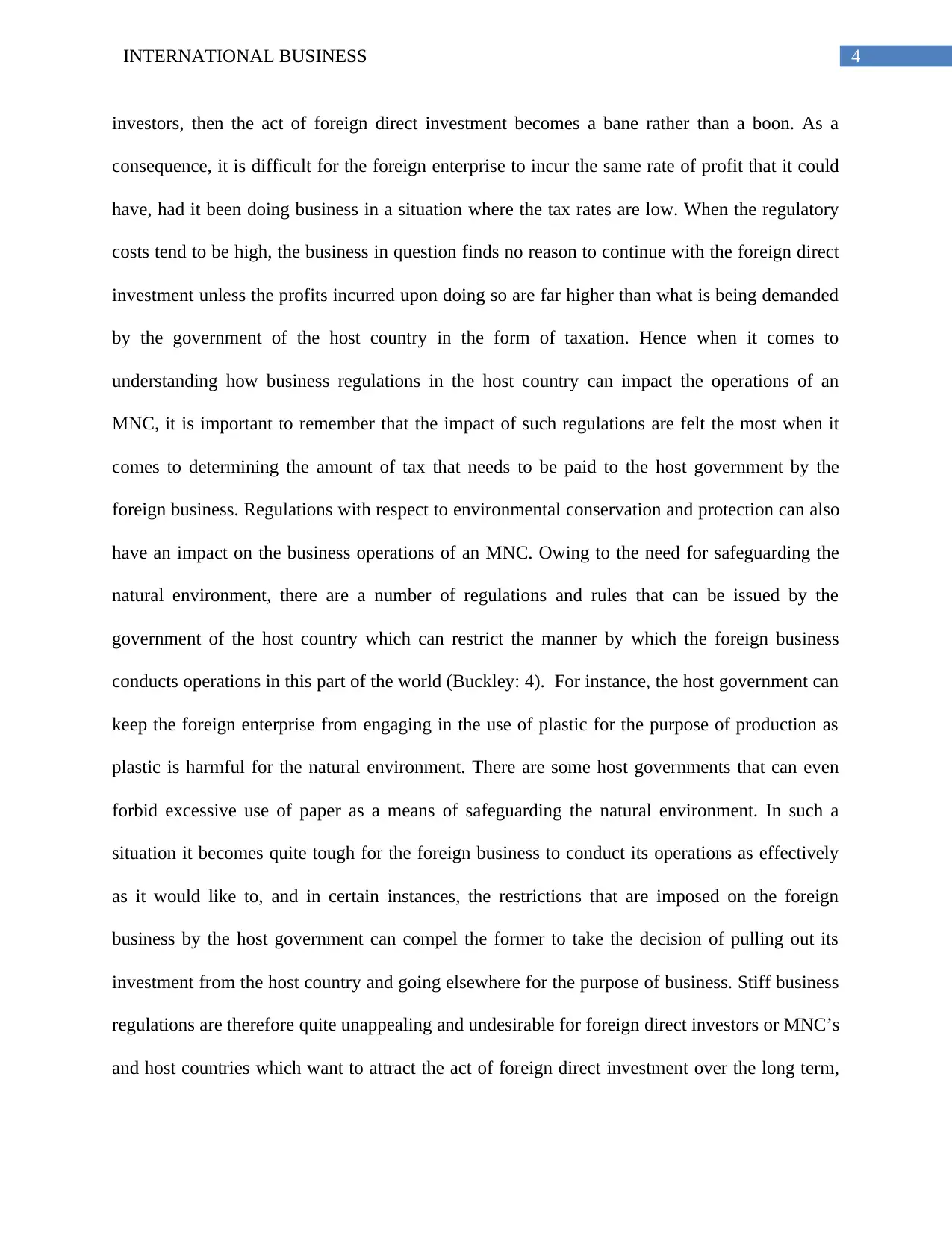
4INTERNATIONAL BUSINESS
investors, then the act of foreign direct investment becomes a bane rather than a boon. As a
consequence, it is difficult for the foreign enterprise to incur the same rate of profit that it could
have, had it been doing business in a situation where the tax rates are low. When the regulatory
costs tend to be high, the business in question finds no reason to continue with the foreign direct
investment unless the profits incurred upon doing so are far higher than what is being demanded
by the government of the host country in the form of taxation. Hence when it comes to
understanding how business regulations in the host country can impact the operations of an
MNC, it is important to remember that the impact of such regulations are felt the most when it
comes to determining the amount of tax that needs to be paid to the host government by the
foreign business. Regulations with respect to environmental conservation and protection can also
have an impact on the business operations of an MNC. Owing to the need for safeguarding the
natural environment, there are a number of regulations and rules that can be issued by the
government of the host country which can restrict the manner by which the foreign business
conducts operations in this part of the world (Buckley: 4). For instance, the host government can
keep the foreign enterprise from engaging in the use of plastic for the purpose of production as
plastic is harmful for the natural environment. There are some host governments that can even
forbid excessive use of paper as a means of safeguarding the natural environment. In such a
situation it becomes quite tough for the foreign business to conduct its operations as effectively
as it would like to, and in certain instances, the restrictions that are imposed on the foreign
business by the host government can compel the former to take the decision of pulling out its
investment from the host country and going elsewhere for the purpose of business. Stiff business
regulations are therefore quite unappealing and undesirable for foreign direct investors or MNC’s
and host countries which want to attract the act of foreign direct investment over the long term,
investors, then the act of foreign direct investment becomes a bane rather than a boon. As a
consequence, it is difficult for the foreign enterprise to incur the same rate of profit that it could
have, had it been doing business in a situation where the tax rates are low. When the regulatory
costs tend to be high, the business in question finds no reason to continue with the foreign direct
investment unless the profits incurred upon doing so are far higher than what is being demanded
by the government of the host country in the form of taxation. Hence when it comes to
understanding how business regulations in the host country can impact the operations of an
MNC, it is important to remember that the impact of such regulations are felt the most when it
comes to determining the amount of tax that needs to be paid to the host government by the
foreign business. Regulations with respect to environmental conservation and protection can also
have an impact on the business operations of an MNC. Owing to the need for safeguarding the
natural environment, there are a number of regulations and rules that can be issued by the
government of the host country which can restrict the manner by which the foreign business
conducts operations in this part of the world (Buckley: 4). For instance, the host government can
keep the foreign enterprise from engaging in the use of plastic for the purpose of production as
plastic is harmful for the natural environment. There are some host governments that can even
forbid excessive use of paper as a means of safeguarding the natural environment. In such a
situation it becomes quite tough for the foreign business to conduct its operations as effectively
as it would like to, and in certain instances, the restrictions that are imposed on the foreign
business by the host government can compel the former to take the decision of pulling out its
investment from the host country and going elsewhere for the purpose of business. Stiff business
regulations are therefore quite unappealing and undesirable for foreign direct investors or MNC’s
and host countries which want to attract the act of foreign direct investment over the long term,
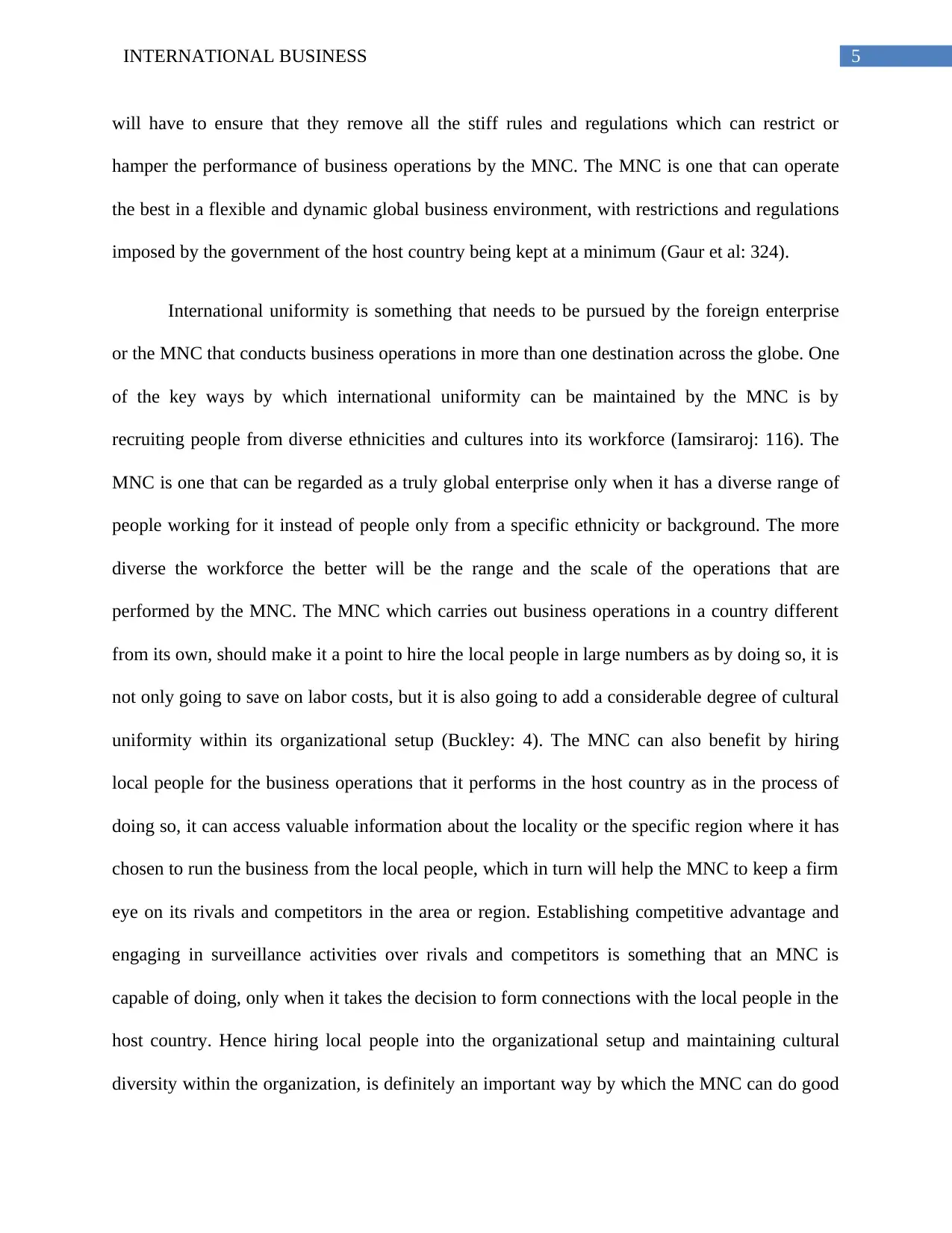
5INTERNATIONAL BUSINESS
will have to ensure that they remove all the stiff rules and regulations which can restrict or
hamper the performance of business operations by the MNC. The MNC is one that can operate
the best in a flexible and dynamic global business environment, with restrictions and regulations
imposed by the government of the host country being kept at a minimum (Gaur et al: 324).
International uniformity is something that needs to be pursued by the foreign enterprise
or the MNC that conducts business operations in more than one destination across the globe. One
of the key ways by which international uniformity can be maintained by the MNC is by
recruiting people from diverse ethnicities and cultures into its workforce (Iamsiraroj: 116). The
MNC is one that can be regarded as a truly global enterprise only when it has a diverse range of
people working for it instead of people only from a specific ethnicity or background. The more
diverse the workforce the better will be the range and the scale of the operations that are
performed by the MNC. The MNC which carries out business operations in a country different
from its own, should make it a point to hire the local people in large numbers as by doing so, it is
not only going to save on labor costs, but it is also going to add a considerable degree of cultural
uniformity within its organizational setup (Buckley: 4). The MNC can also benefit by hiring
local people for the business operations that it performs in the host country as in the process of
doing so, it can access valuable information about the locality or the specific region where it has
chosen to run the business from the local people, which in turn will help the MNC to keep a firm
eye on its rivals and competitors in the area or region. Establishing competitive advantage and
engaging in surveillance activities over rivals and competitors is something that an MNC is
capable of doing, only when it takes the decision to form connections with the local people in the
host country. Hence hiring local people into the organizational setup and maintaining cultural
diversity within the organization, is definitely an important way by which the MNC can do good
will have to ensure that they remove all the stiff rules and regulations which can restrict or
hamper the performance of business operations by the MNC. The MNC is one that can operate
the best in a flexible and dynamic global business environment, with restrictions and regulations
imposed by the government of the host country being kept at a minimum (Gaur et al: 324).
International uniformity is something that needs to be pursued by the foreign enterprise
or the MNC that conducts business operations in more than one destination across the globe. One
of the key ways by which international uniformity can be maintained by the MNC is by
recruiting people from diverse ethnicities and cultures into its workforce (Iamsiraroj: 116). The
MNC is one that can be regarded as a truly global enterprise only when it has a diverse range of
people working for it instead of people only from a specific ethnicity or background. The more
diverse the workforce the better will be the range and the scale of the operations that are
performed by the MNC. The MNC which carries out business operations in a country different
from its own, should make it a point to hire the local people in large numbers as by doing so, it is
not only going to save on labor costs, but it is also going to add a considerable degree of cultural
uniformity within its organizational setup (Buckley: 4). The MNC can also benefit by hiring
local people for the business operations that it performs in the host country as in the process of
doing so, it can access valuable information about the locality or the specific region where it has
chosen to run the business from the local people, which in turn will help the MNC to keep a firm
eye on its rivals and competitors in the area or region. Establishing competitive advantage and
engaging in surveillance activities over rivals and competitors is something that an MNC is
capable of doing, only when it takes the decision to form connections with the local people in the
host country. Hence hiring local people into the organizational setup and maintaining cultural
diversity within the organization, is definitely an important way by which the MNC can do good
⊘ This is a preview!⊘
Do you want full access?
Subscribe today to unlock all pages.

Trusted by 1+ million students worldwide
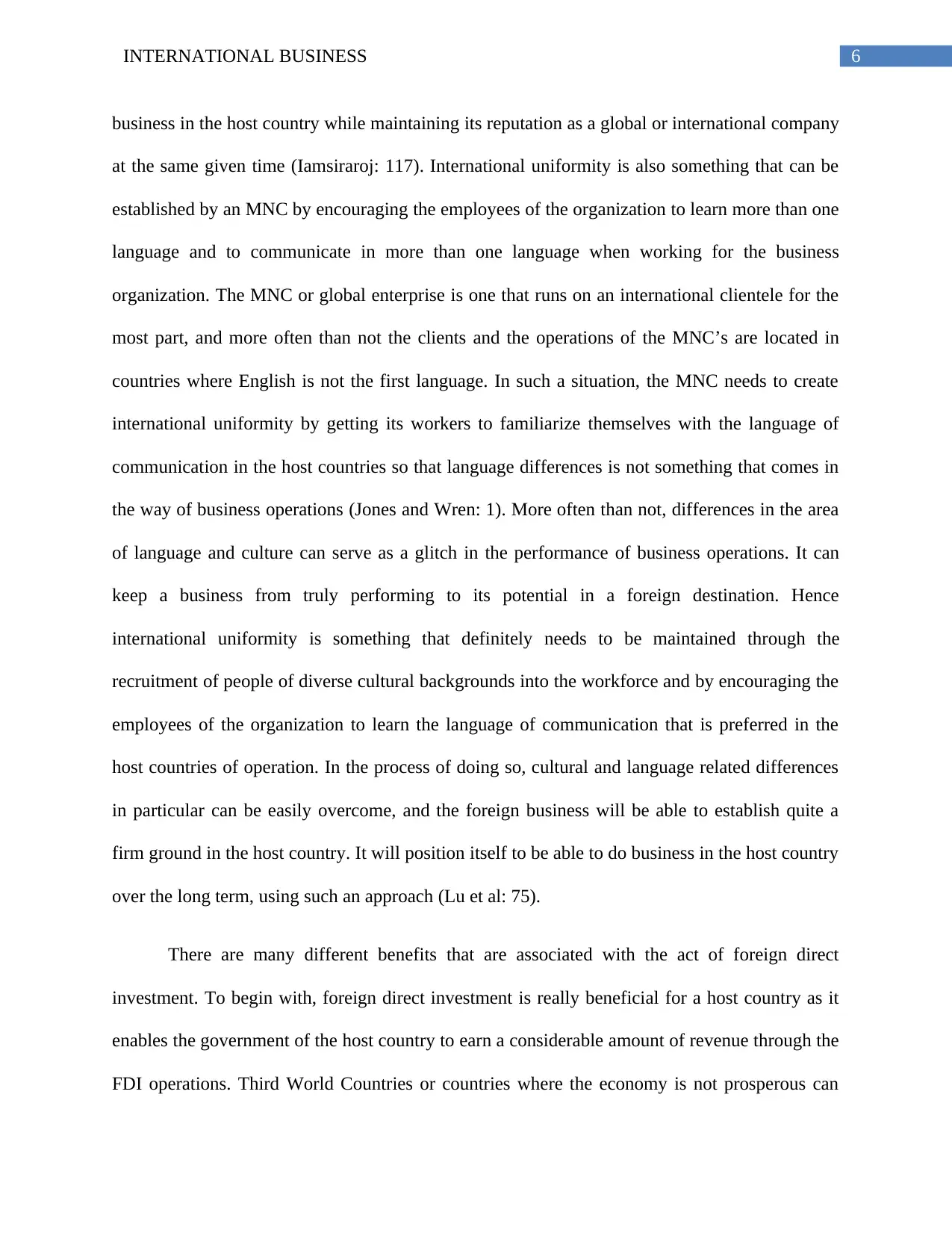
6INTERNATIONAL BUSINESS
business in the host country while maintaining its reputation as a global or international company
at the same given time (Iamsiraroj: 117). International uniformity is also something that can be
established by an MNC by encouraging the employees of the organization to learn more than one
language and to communicate in more than one language when working for the business
organization. The MNC or global enterprise is one that runs on an international clientele for the
most part, and more often than not the clients and the operations of the MNC’s are located in
countries where English is not the first language. In such a situation, the MNC needs to create
international uniformity by getting its workers to familiarize themselves with the language of
communication in the host countries so that language differences is not something that comes in
the way of business operations (Jones and Wren: 1). More often than not, differences in the area
of language and culture can serve as a glitch in the performance of business operations. It can
keep a business from truly performing to its potential in a foreign destination. Hence
international uniformity is something that definitely needs to be maintained through the
recruitment of people of diverse cultural backgrounds into the workforce and by encouraging the
employees of the organization to learn the language of communication that is preferred in the
host countries of operation. In the process of doing so, cultural and language related differences
in particular can be easily overcome, and the foreign business will be able to establish quite a
firm ground in the host country. It will position itself to be able to do business in the host country
over the long term, using such an approach (Lu et al: 75).
There are many different benefits that are associated with the act of foreign direct
investment. To begin with, foreign direct investment is really beneficial for a host country as it
enables the government of the host country to earn a considerable amount of revenue through the
FDI operations. Third World Countries or countries where the economy is not prosperous can
business in the host country while maintaining its reputation as a global or international company
at the same given time (Iamsiraroj: 117). International uniformity is also something that can be
established by an MNC by encouraging the employees of the organization to learn more than one
language and to communicate in more than one language when working for the business
organization. The MNC or global enterprise is one that runs on an international clientele for the
most part, and more often than not the clients and the operations of the MNC’s are located in
countries where English is not the first language. In such a situation, the MNC needs to create
international uniformity by getting its workers to familiarize themselves with the language of
communication in the host countries so that language differences is not something that comes in
the way of business operations (Jones and Wren: 1). More often than not, differences in the area
of language and culture can serve as a glitch in the performance of business operations. It can
keep a business from truly performing to its potential in a foreign destination. Hence
international uniformity is something that definitely needs to be maintained through the
recruitment of people of diverse cultural backgrounds into the workforce and by encouraging the
employees of the organization to learn the language of communication that is preferred in the
host countries of operation. In the process of doing so, cultural and language related differences
in particular can be easily overcome, and the foreign business will be able to establish quite a
firm ground in the host country. It will position itself to be able to do business in the host country
over the long term, using such an approach (Lu et al: 75).
There are many different benefits that are associated with the act of foreign direct
investment. To begin with, foreign direct investment is really beneficial for a host country as it
enables the government of the host country to earn a considerable amount of revenue through the
FDI operations. Third World Countries or countries where the economy is not prosperous can
Paraphrase This Document
Need a fresh take? Get an instant paraphrase of this document with our AI Paraphraser
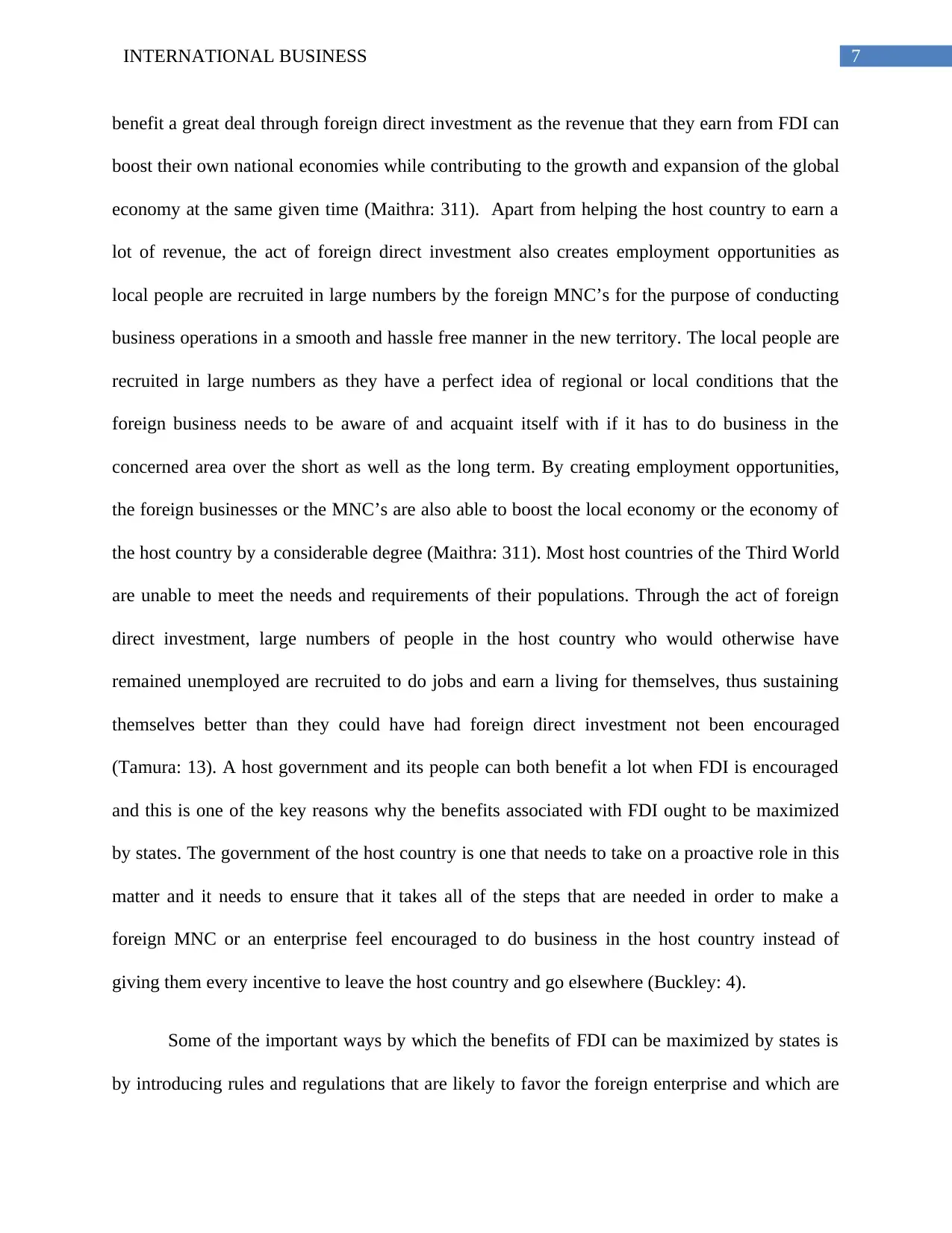
7INTERNATIONAL BUSINESS
benefit a great deal through foreign direct investment as the revenue that they earn from FDI can
boost their own national economies while contributing to the growth and expansion of the global
economy at the same given time (Maithra: 311). Apart from helping the host country to earn a
lot of revenue, the act of foreign direct investment also creates employment opportunities as
local people are recruited in large numbers by the foreign MNC’s for the purpose of conducting
business operations in a smooth and hassle free manner in the new territory. The local people are
recruited in large numbers as they have a perfect idea of regional or local conditions that the
foreign business needs to be aware of and acquaint itself with if it has to do business in the
concerned area over the short as well as the long term. By creating employment opportunities,
the foreign businesses or the MNC’s are also able to boost the local economy or the economy of
the host country by a considerable degree (Maithra: 311). Most host countries of the Third World
are unable to meet the needs and requirements of their populations. Through the act of foreign
direct investment, large numbers of people in the host country who would otherwise have
remained unemployed are recruited to do jobs and earn a living for themselves, thus sustaining
themselves better than they could have had foreign direct investment not been encouraged
(Tamura: 13). A host government and its people can both benefit a lot when FDI is encouraged
and this is one of the key reasons why the benefits associated with FDI ought to be maximized
by states. The government of the host country is one that needs to take on a proactive role in this
matter and it needs to ensure that it takes all of the steps that are needed in order to make a
foreign MNC or an enterprise feel encouraged to do business in the host country instead of
giving them every incentive to leave the host country and go elsewhere (Buckley: 4).
Some of the important ways by which the benefits of FDI can be maximized by states is
by introducing rules and regulations that are likely to favor the foreign enterprise and which are
benefit a great deal through foreign direct investment as the revenue that they earn from FDI can
boost their own national economies while contributing to the growth and expansion of the global
economy at the same given time (Maithra: 311). Apart from helping the host country to earn a
lot of revenue, the act of foreign direct investment also creates employment opportunities as
local people are recruited in large numbers by the foreign MNC’s for the purpose of conducting
business operations in a smooth and hassle free manner in the new territory. The local people are
recruited in large numbers as they have a perfect idea of regional or local conditions that the
foreign business needs to be aware of and acquaint itself with if it has to do business in the
concerned area over the short as well as the long term. By creating employment opportunities,
the foreign businesses or the MNC’s are also able to boost the local economy or the economy of
the host country by a considerable degree (Maithra: 311). Most host countries of the Third World
are unable to meet the needs and requirements of their populations. Through the act of foreign
direct investment, large numbers of people in the host country who would otherwise have
remained unemployed are recruited to do jobs and earn a living for themselves, thus sustaining
themselves better than they could have had foreign direct investment not been encouraged
(Tamura: 13). A host government and its people can both benefit a lot when FDI is encouraged
and this is one of the key reasons why the benefits associated with FDI ought to be maximized
by states. The government of the host country is one that needs to take on a proactive role in this
matter and it needs to ensure that it takes all of the steps that are needed in order to make a
foreign MNC or an enterprise feel encouraged to do business in the host country instead of
giving them every incentive to leave the host country and go elsewhere (Buckley: 4).
Some of the important ways by which the benefits of FDI can be maximized by states is
by introducing rules and regulations that are likely to favor the foreign enterprise and which are
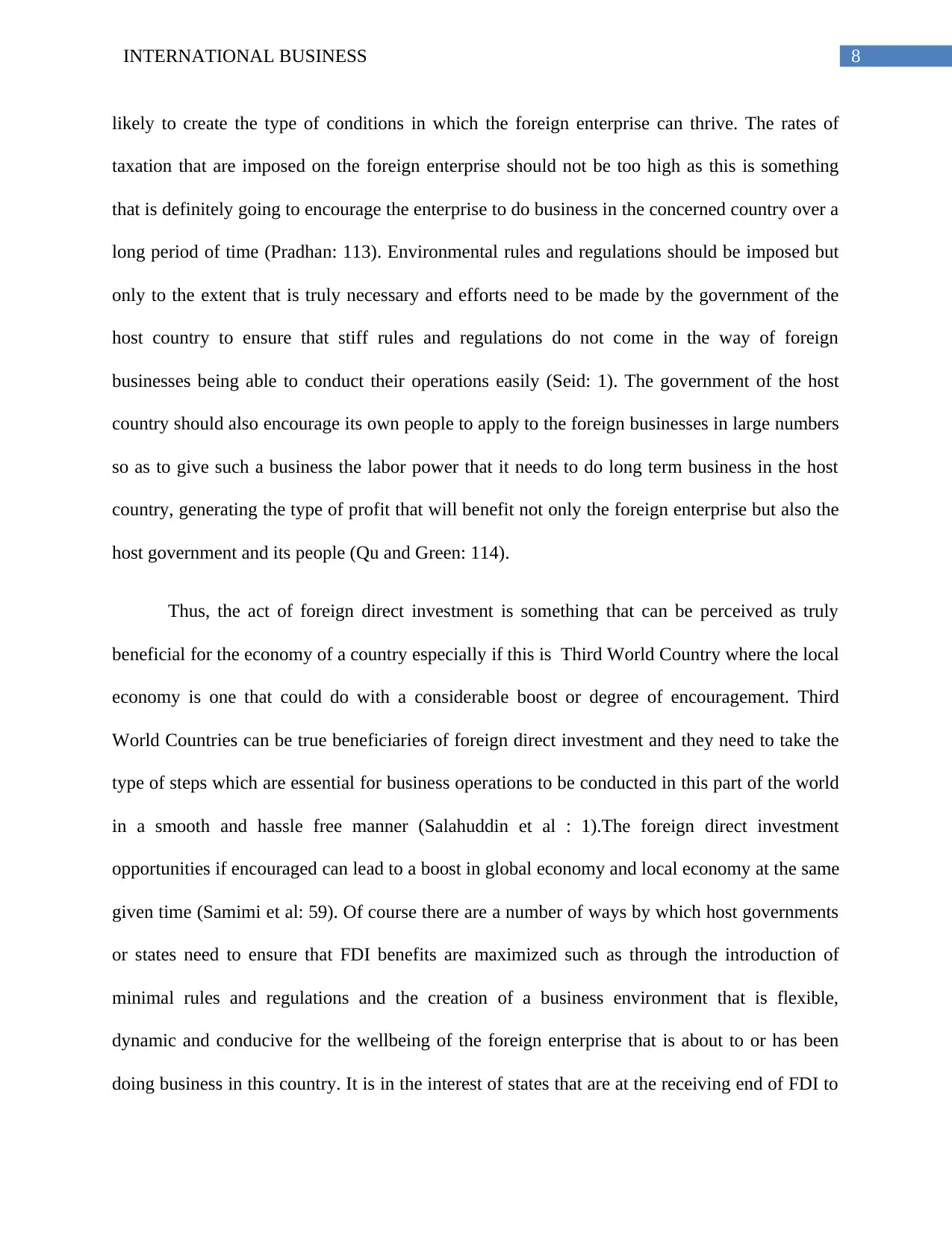
8INTERNATIONAL BUSINESS
likely to create the type of conditions in which the foreign enterprise can thrive. The rates of
taxation that are imposed on the foreign enterprise should not be too high as this is something
that is definitely going to encourage the enterprise to do business in the concerned country over a
long period of time (Pradhan: 113). Environmental rules and regulations should be imposed but
only to the extent that is truly necessary and efforts need to be made by the government of the
host country to ensure that stiff rules and regulations do not come in the way of foreign
businesses being able to conduct their operations easily (Seid: 1). The government of the host
country should also encourage its own people to apply to the foreign businesses in large numbers
so as to give such a business the labor power that it needs to do long term business in the host
country, generating the type of profit that will benefit not only the foreign enterprise but also the
host government and its people (Qu and Green: 114).
Thus, the act of foreign direct investment is something that can be perceived as truly
beneficial for the economy of a country especially if this is Third World Country where the local
economy is one that could do with a considerable boost or degree of encouragement. Third
World Countries can be true beneficiaries of foreign direct investment and they need to take the
type of steps which are essential for business operations to be conducted in this part of the world
in a smooth and hassle free manner (Salahuddin et al : 1).The foreign direct investment
opportunities if encouraged can lead to a boost in global economy and local economy at the same
given time (Samimi et al: 59). Of course there are a number of ways by which host governments
or states need to ensure that FDI benefits are maximized such as through the introduction of
minimal rules and regulations and the creation of a business environment that is flexible,
dynamic and conducive for the wellbeing of the foreign enterprise that is about to or has been
doing business in this country. It is in the interest of states that are at the receiving end of FDI to
likely to create the type of conditions in which the foreign enterprise can thrive. The rates of
taxation that are imposed on the foreign enterprise should not be too high as this is something
that is definitely going to encourage the enterprise to do business in the concerned country over a
long period of time (Pradhan: 113). Environmental rules and regulations should be imposed but
only to the extent that is truly necessary and efforts need to be made by the government of the
host country to ensure that stiff rules and regulations do not come in the way of foreign
businesses being able to conduct their operations easily (Seid: 1). The government of the host
country should also encourage its own people to apply to the foreign businesses in large numbers
so as to give such a business the labor power that it needs to do long term business in the host
country, generating the type of profit that will benefit not only the foreign enterprise but also the
host government and its people (Qu and Green: 114).
Thus, the act of foreign direct investment is something that can be perceived as truly
beneficial for the economy of a country especially if this is Third World Country where the local
economy is one that could do with a considerable boost or degree of encouragement. Third
World Countries can be true beneficiaries of foreign direct investment and they need to take the
type of steps which are essential for business operations to be conducted in this part of the world
in a smooth and hassle free manner (Salahuddin et al : 1).The foreign direct investment
opportunities if encouraged can lead to a boost in global economy and local economy at the same
given time (Samimi et al: 59). Of course there are a number of ways by which host governments
or states need to ensure that FDI benefits are maximized such as through the introduction of
minimal rules and regulations and the creation of a business environment that is flexible,
dynamic and conducive for the wellbeing of the foreign enterprise that is about to or has been
doing business in this country. It is in the interest of states that are at the receiving end of FDI to
⊘ This is a preview!⊘
Do you want full access?
Subscribe today to unlock all pages.

Trusted by 1+ million students worldwide
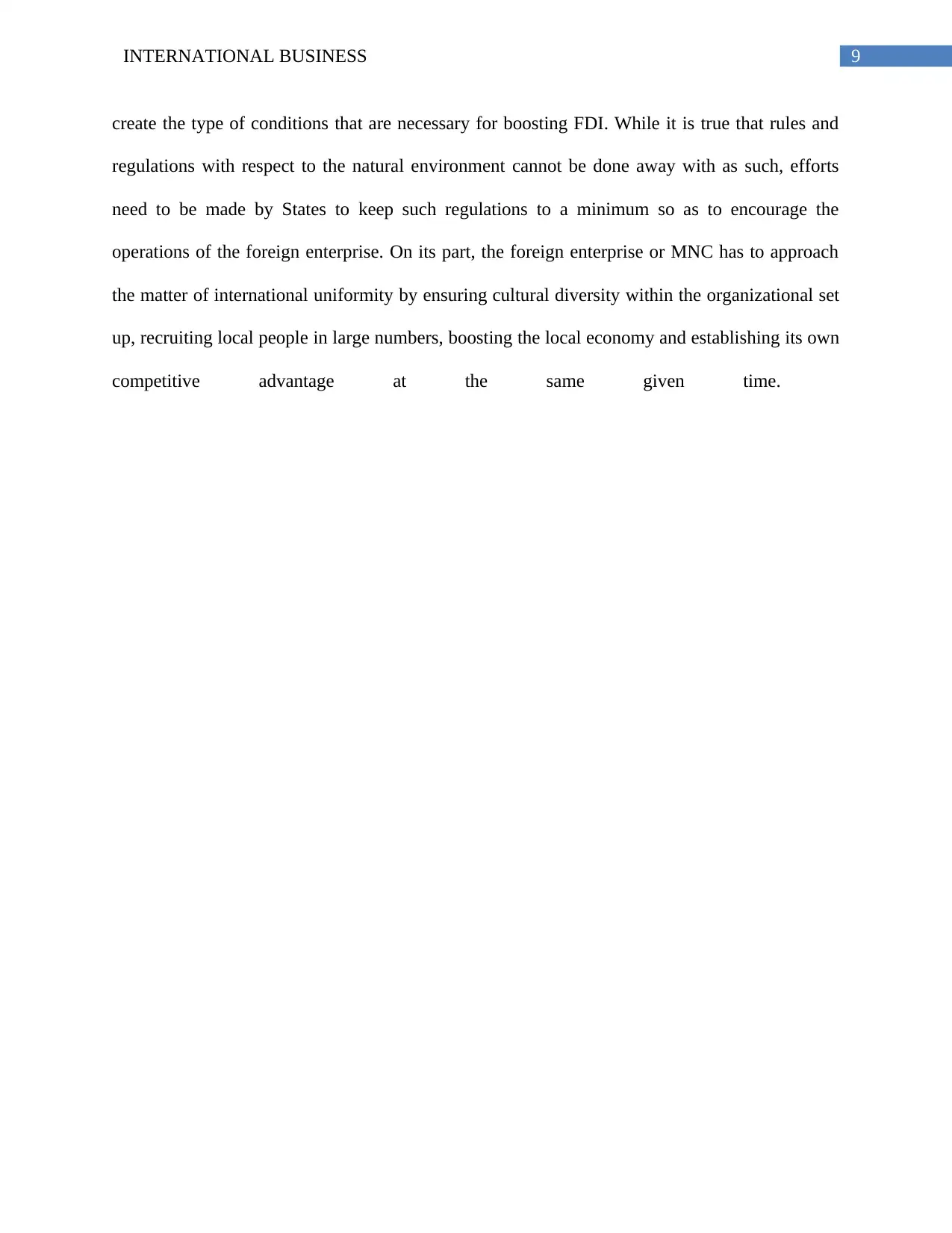
9INTERNATIONAL BUSINESS
create the type of conditions that are necessary for boosting FDI. While it is true that rules and
regulations with respect to the natural environment cannot be done away with as such, efforts
need to be made by States to keep such regulations to a minimum so as to encourage the
operations of the foreign enterprise. On its part, the foreign enterprise or MNC has to approach
the matter of international uniformity by ensuring cultural diversity within the organizational set
up, recruiting local people in large numbers, boosting the local economy and establishing its own
competitive advantage at the same given time.
create the type of conditions that are necessary for boosting FDI. While it is true that rules and
regulations with respect to the natural environment cannot be done away with as such, efforts
need to be made by States to keep such regulations to a minimum so as to encourage the
operations of the foreign enterprise. On its part, the foreign enterprise or MNC has to approach
the matter of international uniformity by ensuring cultural diversity within the organizational set
up, recruiting local people in large numbers, boosting the local economy and establishing its own
competitive advantage at the same given time.
Paraphrase This Document
Need a fresh take? Get an instant paraphrase of this document with our AI Paraphraser
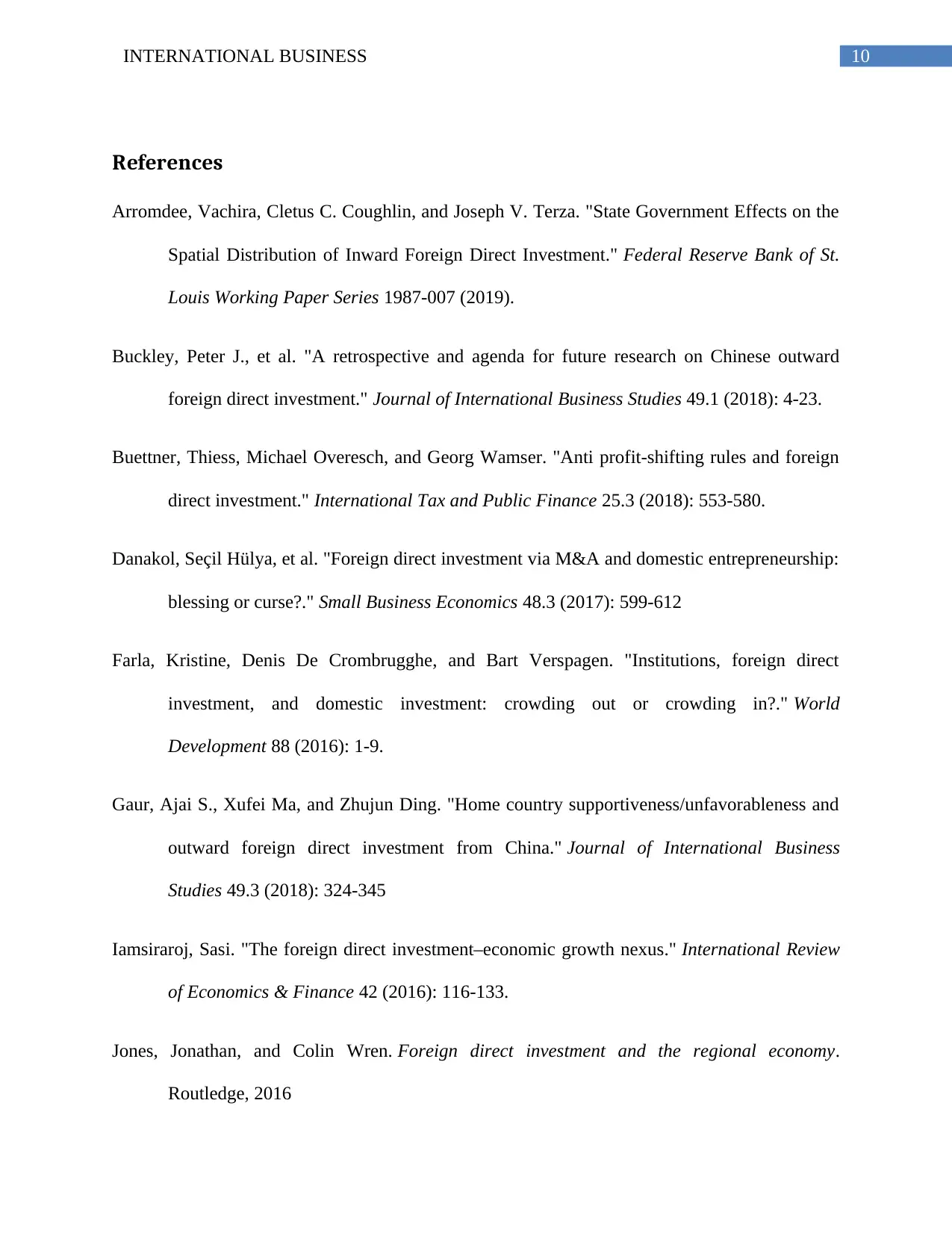
10INTERNATIONAL BUSINESS
References
Arromdee, Vachira, Cletus C. Coughlin, and Joseph V. Terza. "State Government Effects on the
Spatial Distribution of Inward Foreign Direct Investment." Federal Reserve Bank of St.
Louis Working Paper Series 1987-007 (2019).
Buckley, Peter J., et al. "A retrospective and agenda for future research on Chinese outward
foreign direct investment." Journal of International Business Studies 49.1 (2018): 4-23.
Buettner, Thiess, Michael Overesch, and Georg Wamser. "Anti profit-shifting rules and foreign
direct investment." International Tax and Public Finance 25.3 (2018): 553-580.
Danakol, Seçil Hülya, et al. "Foreign direct investment via M&A and domestic entrepreneurship:
blessing or curse?." Small Business Economics 48.3 (2017): 599-612
Farla, Kristine, Denis De Crombrugghe, and Bart Verspagen. "Institutions, foreign direct
investment, and domestic investment: crowding out or crowding in?." World
Development 88 (2016): 1-9.
Gaur, Ajai S., Xufei Ma, and Zhujun Ding. "Home country supportiveness/unfavorableness and
outward foreign direct investment from China." Journal of International Business
Studies 49.3 (2018): 324-345
Iamsiraroj, Sasi. "The foreign direct investment–economic growth nexus." International Review
of Economics & Finance 42 (2016): 116-133.
Jones, Jonathan, and Colin Wren. Foreign direct investment and the regional economy.
Routledge, 2016
References
Arromdee, Vachira, Cletus C. Coughlin, and Joseph V. Terza. "State Government Effects on the
Spatial Distribution of Inward Foreign Direct Investment." Federal Reserve Bank of St.
Louis Working Paper Series 1987-007 (2019).
Buckley, Peter J., et al. "A retrospective and agenda for future research on Chinese outward
foreign direct investment." Journal of International Business Studies 49.1 (2018): 4-23.
Buettner, Thiess, Michael Overesch, and Georg Wamser. "Anti profit-shifting rules and foreign
direct investment." International Tax and Public Finance 25.3 (2018): 553-580.
Danakol, Seçil Hülya, et al. "Foreign direct investment via M&A and domestic entrepreneurship:
blessing or curse?." Small Business Economics 48.3 (2017): 599-612
Farla, Kristine, Denis De Crombrugghe, and Bart Verspagen. "Institutions, foreign direct
investment, and domestic investment: crowding out or crowding in?." World
Development 88 (2016): 1-9.
Gaur, Ajai S., Xufei Ma, and Zhujun Ding. "Home country supportiveness/unfavorableness and
outward foreign direct investment from China." Journal of International Business
Studies 49.3 (2018): 324-345
Iamsiraroj, Sasi. "The foreign direct investment–economic growth nexus." International Review
of Economics & Finance 42 (2016): 116-133.
Jones, Jonathan, and Colin Wren. Foreign direct investment and the regional economy.
Routledge, 2016
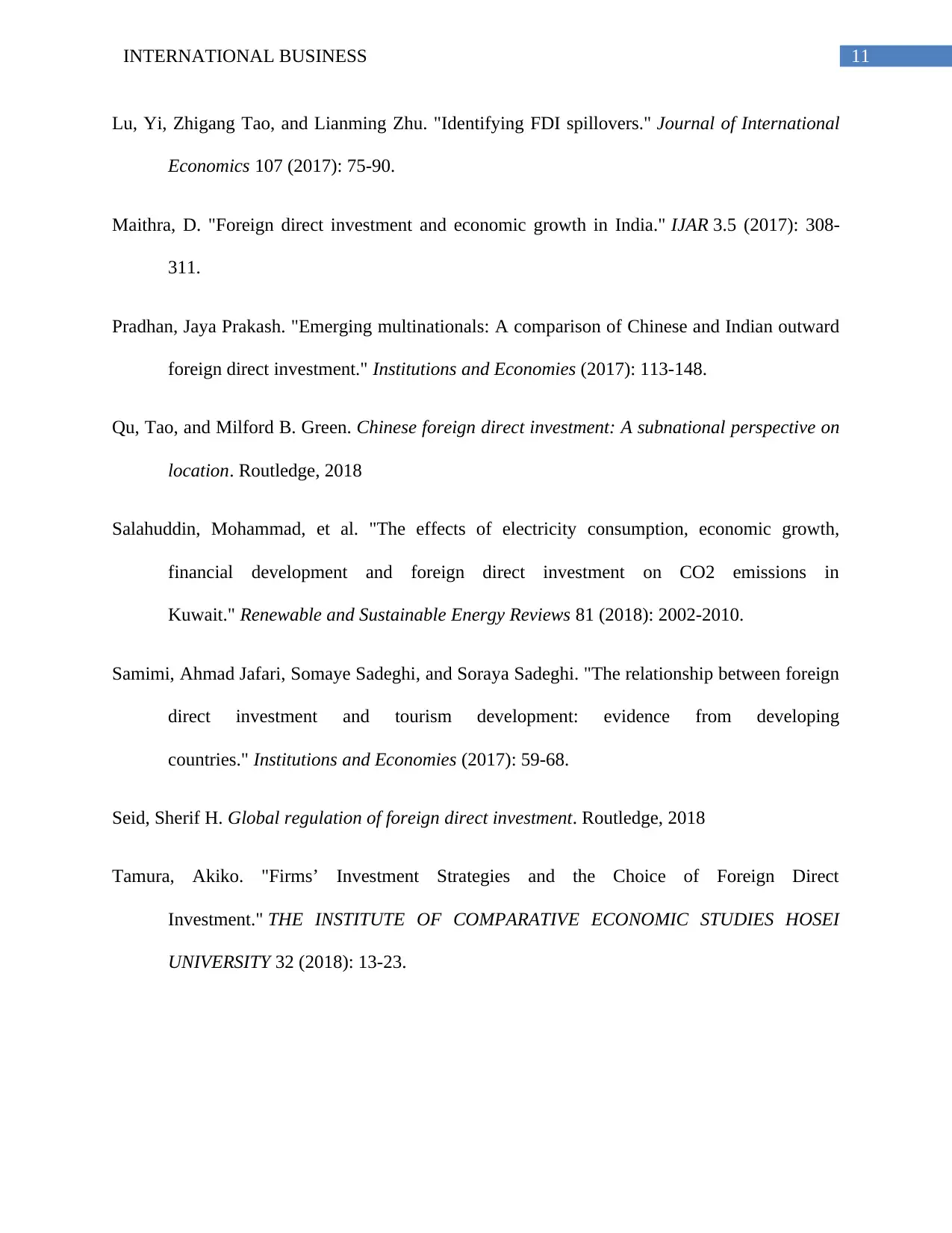
11INTERNATIONAL BUSINESS
Lu, Yi, Zhigang Tao, and Lianming Zhu. "Identifying FDI spillovers." Journal of International
Economics 107 (2017): 75-90.
Maithra, D. "Foreign direct investment and economic growth in India." IJAR 3.5 (2017): 308-
311.
Pradhan, Jaya Prakash. "Emerging multinationals: A comparison of Chinese and Indian outward
foreign direct investment." Institutions and Economies (2017): 113-148.
Qu, Tao, and Milford B. Green. Chinese foreign direct investment: A subnational perspective on
location. Routledge, 2018
Salahuddin, Mohammad, et al. "The effects of electricity consumption, economic growth,
financial development and foreign direct investment on CO2 emissions in
Kuwait." Renewable and Sustainable Energy Reviews 81 (2018): 2002-2010.
Samimi, Ahmad Jafari, Somaye Sadeghi, and Soraya Sadeghi. "The relationship between foreign
direct investment and tourism development: evidence from developing
countries." Institutions and Economies (2017): 59-68.
Seid, Sherif H. Global regulation of foreign direct investment. Routledge, 2018
Tamura, Akiko. "Firms’ Investment Strategies and the Choice of Foreign Direct
Investment." THE INSTITUTE OF COMPARATIVE ECONOMIC STUDIES HOSEI
UNIVERSITY 32 (2018): 13-23.
Lu, Yi, Zhigang Tao, and Lianming Zhu. "Identifying FDI spillovers." Journal of International
Economics 107 (2017): 75-90.
Maithra, D. "Foreign direct investment and economic growth in India." IJAR 3.5 (2017): 308-
311.
Pradhan, Jaya Prakash. "Emerging multinationals: A comparison of Chinese and Indian outward
foreign direct investment." Institutions and Economies (2017): 113-148.
Qu, Tao, and Milford B. Green. Chinese foreign direct investment: A subnational perspective on
location. Routledge, 2018
Salahuddin, Mohammad, et al. "The effects of electricity consumption, economic growth,
financial development and foreign direct investment on CO2 emissions in
Kuwait." Renewable and Sustainable Energy Reviews 81 (2018): 2002-2010.
Samimi, Ahmad Jafari, Somaye Sadeghi, and Soraya Sadeghi. "The relationship between foreign
direct investment and tourism development: evidence from developing
countries." Institutions and Economies (2017): 59-68.
Seid, Sherif H. Global regulation of foreign direct investment. Routledge, 2018
Tamura, Akiko. "Firms’ Investment Strategies and the Choice of Foreign Direct
Investment." THE INSTITUTE OF COMPARATIVE ECONOMIC STUDIES HOSEI
UNIVERSITY 32 (2018): 13-23.
⊘ This is a preview!⊘
Do you want full access?
Subscribe today to unlock all pages.

Trusted by 1+ million students worldwide
1 out of 12
Related Documents
Your All-in-One AI-Powered Toolkit for Academic Success.
+13062052269
info@desklib.com
Available 24*7 on WhatsApp / Email
![[object Object]](/_next/static/media/star-bottom.7253800d.svg)
Unlock your academic potential
Copyright © 2020–2026 A2Z Services. All Rights Reserved. Developed and managed by ZUCOL.





